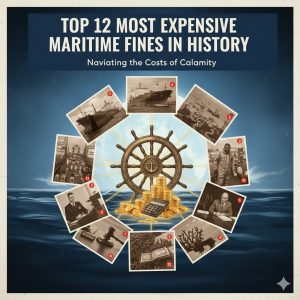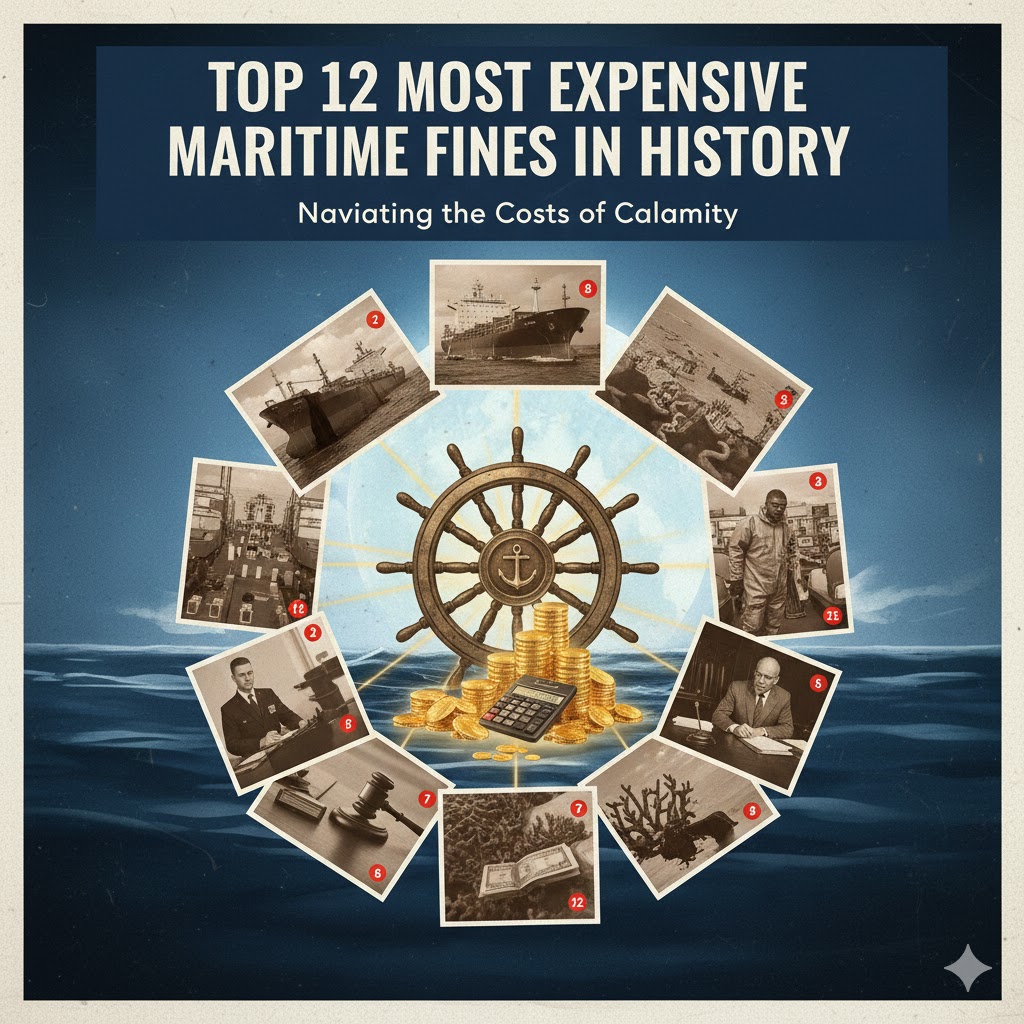
From oil spills to cartel conspiracies, discover the 12 most expensive maritime fines in history. Learn how these record-breaking penalties reshaped regulations, industry practices, and corporate accountability in global shipping.
When Mistakes at Sea Cost Billions 🌊
The sea may be vast, but accountability knows no horizon. Modern shipping companies, cruise lines, and offshore operators live under strict oversight from regulators, insurers, and governments. When things go wrong—whether through oil spills, safety violations, or cartel price-fixing—the financial consequences can be staggering.
According to UNCTAD, global shipping handles more than 80% of world trade by volume. Even small regulatory lapses can ripple through economies. That’s why maritime fines are not just punishments—they are signals to the entire industry about what is unacceptable. From the Exxon Valdez spill that transformed U.S. legislation to modern cases involving digital cartels, the largest fines in history are reminders that compliance is non-negotiable.
This article explores the 12 most expensive maritime fines in history, telling the stories behind them and explaining their impact on safety, environment, and governance.
Why Maritime Fines Matter
- Environmental Protection – Oil and chemical spills destroy fragile ecosystems. Massive fines ensure polluters pay.
- Safety Culture – Negligence in training or equipment maintenance often leads to human casualties. Fines pressure companies to invest in crew welfare.
- Fair Trade – Collusion among shipping lines or freight forwarders distorts markets. Antitrust fines protect global commerce.
- Global Accountability – Maritime law spans flag states, port states, and international bodies like IMO, Paris MoU, and ILO. Fines demonstrate global enforcement in action.
–
The Top 12 Most Expensive Maritime Fines
1. BP – Deepwater Horizon Oil Spill (2010) – $20.8 Billion
The largest environmental fine in U.S. history, BP’s settlement over the Deepwater Horizon disaster still echoes in maritime law. The explosion killed 11 workers and released 4.9 million barrels of oil into the Gulf of Mexico.
👉 Impact: Sparked stricter U.S. offshore drilling regulations and reshaped global offshore safety standards.
2. Exxon – Exxon Valdez Oil Spill (1989, settlements through 2008) – $5 Billion+
Though technically pre-21st century, the litigation stretched decades. Exxon’s Valdez tanker spilled 11 million gallons of crude oil in Alaska. Courts imposed billions in damages, some later reduced.
👉 Impact: Directly led to the U.S. Oil Pollution Act of 1990 (OPA 90), requiring double-hull tankers and stricter liability rules.
3. Hyundai Glovis and Others – Car Carrier Antitrust Fines (2018) – €395 Million
The European Commission fined four car carriers—including NYK Line, K Line, and MOL—for operating a cartel on vehicle transport between 2006–2013.
👉 Impact: Exposed collusion in liner shipping, reinforcing EU competition law.
4. Carnival Corporation – Environmental Crimes Settlement (2019) – $20 Million (on top of $40 Million in 2016)
The cruise giant paid $40 million in 2016 for illegally dumping oily waste, then another $20 million in 2019 for violating probation terms.
👉 Impact: Highlighted gaps in compliance culture within passenger shipping, leading to tighter U.S. Coast Guard monitoring.
5. Maersk, MSC, and CMA CGM – U.S. Antitrust Investigations (2017–2022) – Hundreds of Millions in Penalties
Global container giants faced multiple probes by U.S. and EU authorities for alleged price-fixing and capacity manipulation. Settlements and compliance programs cost hundreds of millions.
👉 Impact: Pushed carriers to adopt transparent alliances under stricter regulatory watch.
6. China COSCO Shipping – Safety and Environmental Fines (2019–2021) – $150 Million+ (aggregate)
COSCO faced penalties for multiple violations, from sulphur cap breaches to port safety violations.
👉 Impact: Sent a message to state-owned carriers that IMO 2020 sulphur rules would be strictly enforced.
7. Mitsui O.S.K. Lines (MOL) – Oil Spill and Bribery Cases (2010s) – $130 Million+
MOL was fined in U.S. courts for bribery of officials and for environmental crimes relating to waste dumping.
👉 Impact: Reinforced U.S. DOJ’s aggressive pursuit of maritime compliance cases.
8. Prestige Oil Spill (2002) – €1.5 Billion in Claims and Penalties
The Prestige tanker sank off Spain, spilling 60,000 tons of oil. Years of litigation ended in record compensation awards against the ship’s insurer and owners.
👉 Impact: Exposed weaknesses in single-hull tankers and led the EU to accelerate their phase-out.
9. Evergreen – Ever Given Suez Canal Blockage (2021) – $550 Million Settlement
When the Ever Given blocked the Suez Canal, global trade losses were estimated at $9.6 billion per day (Lloyd’s List). The Egyptian Suez Canal Authority demanded $916 million before settling at $550 million.
👉 Impact: Triggered discussions on mega-ship risks and insurance liabilities.
10. Royal Caribbean – Environmental Dumping Case (1999–2000, penalties continuing into 2000s) – $27 Million+
Convicted of dumping oil and chemicals into U.S. waters, Royal Caribbean paid record fines at the time.
👉 Impact: A watershed case for cruise line environmental compliance, with U.S. Coast Guard stepping up inspections.
11. Petrobras – Oil Spills and Corruption Penalties (2000s–2010s) – $2.95 Billion Settlement (2018)
While partly political, Brazilian oil giant Petrobras faced one of the world’s largest corporate settlements related to corruption and environmental damage.
👉 Impact: Set new benchmarks for accountability in state-owned maritime-linked enterprises.
12. Hanjin Shipping – Bankruptcy & Regulatory Fines (2016) – $10 Billion+ Losses and Liabilities
Although not a fine in the environmental sense, Hanjin’s collapse left billions in unpaid port fees, cargo delays, and regulatory penalties.
👉 Impact: Shocked the industry, showing how financial mismanagement can ripple into legal liabilities.
–
Lessons Learned from These Fines
-
Prevention is cheaper than penalties – Oil spills and sulphur violations show that investing in safety saves billions.
-
Culture matters – Carnival’s repeated violations revealed that fines alone don’t change behavior without deeper corporate reform.
-
Global enforcement is rising – From EU cartels to U.S. DOJ cases, shipping is no longer immune to land-based accountability.
-
Mega-ships mean mega-liabilities – The Ever Given case proved that one grounding can trigger near-trillion-dollar trade impacts.
Frequently Asked Questions
What types of violations lead to the biggest maritime fines?
Usually oil spills, safety breaches, cartel collusion, and environmental dumping.
Are individual seafarers fined, or only companies?
Both. Companies bear the largest fines, but masters and engineers can face personal criminal liability.
Do fines actually improve safety?
Evidence suggests yes. For example, after Exxon Valdez, double-hull tankers became mandatory, significantly reducing spill risks.
Can insurance cover maritime fines?
P&I Clubs sometimes cover related liabilities but generally exclude criminal fines.
Which region enforces the strictest fines?
The United States (DOJ, EPA, Coast Guard) is historically the toughest enforcer, followed by the EU.
Conclusion: The Cost of Ignoring Compliance 💰
The most expensive maritime fines in history carry a message louder than a ship’s whistle: cutting corners costs lives, ecosystems, and billions of dollars. From the Deepwater Horizon to the Ever Given, these cases reveal that compliance is not paperwork—it’s survival.
For seafarers, officers, and maritime executives, the lesson is clear: invest in safety, training, and environmental protection, or risk becoming the next headline.

